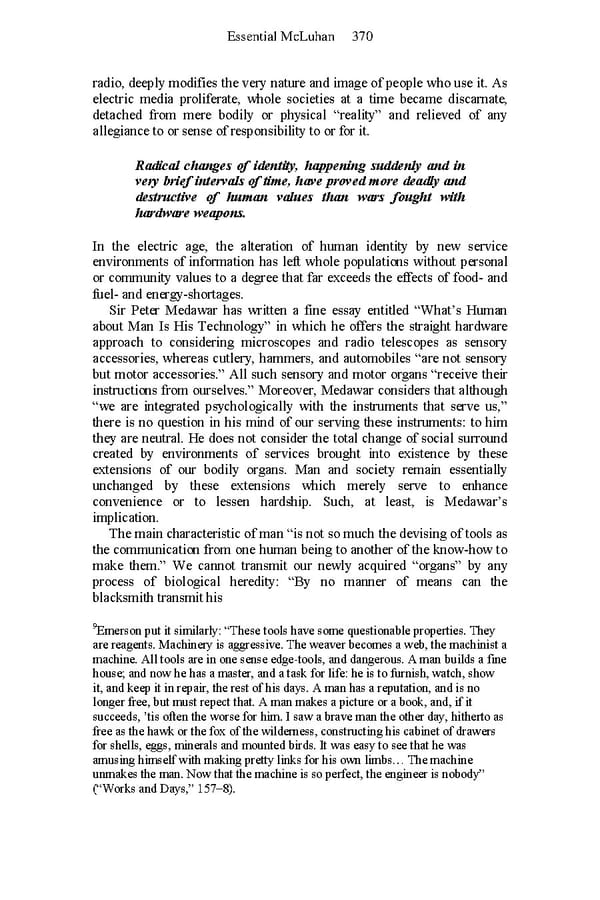Essential McLuhan 370 radio, deeply modifies the very nature and image of people who use it. As electric media proliferate, whole societies at a time became discarnate, detached from mere bodily or physical “reality” and relieved of any allegiance to or sense of responsibility to or for it. Radical changes of identity, happening suddenly and in very brief intervals of time, have proved more deadly and destructive of human values than wars fought with hardware weapons. In the electric age, the alteration of human identity by new service environments of information has left whole populations without personal or community values to a degree that far exceeds the effects of food- and fuel- and energy-shortages. Sir Peter Medawar has written a fine essay entitled “What’s Human about Man Is His Technology” in which he offers the straight hardware approach to considering microscopes and radio telescopes as sensory accessories, whereas cutlery, hammers, and automobiles “are not sensory but motor accessories.” All such sensory and motor organs “receive their instructions from ourselves.” Moreover, Medawar considers that although “we are integrated psychologically with the instruments that serve us,” there is no question in his mind of our serving these instruments: to him they are neutral. He does not consider the total change of social surround created by environments of services brought into existence by these extensions of our bodily organs. Man and society remain essentially unchanged by these extensions which merely serve to enhance convenience or to lessen hardship. Such, at least, is Medawar’s implication. The main characteristic of man “is not so much the devising of tools as the communication from one human being to another of the know-how to make them.” We cannot transmit our newly acquired “organs” by any process of biological heredity: “By no manner of means can the blacksmith transmit his 9 Emerson put it similarly: “These tools have some questionable properties. They are reagents. Machinery is aggressive. The weaver becomes a web, the machinist a machine. All tools are in one sense edge-tools, and dangerous. A man builds a fine house; and now he has a master, and a task for life: he is to furnish, watch, show it, and keep it in repair, the rest of his days. A man has a reputation, and is no longer free, but must repect that. A man makes a picture or a book, and, if it succeeds, ’tis often the worse for him. I saw a brave man the other day, hitherto as free as the hawk or the fox of the wilderness, constructing his cabinet of drawers for shells, eggs, minerals and mounted birds. It was easy to see that he was amusing himself with making pretty links for his own limbs… The machine unmakes the man. Now that the machine is so perfect, the engineer is nobody” (“Works and Days,” 157–8).
 Essential McLuhan Page 376 Page 378
Essential McLuhan Page 376 Page 378